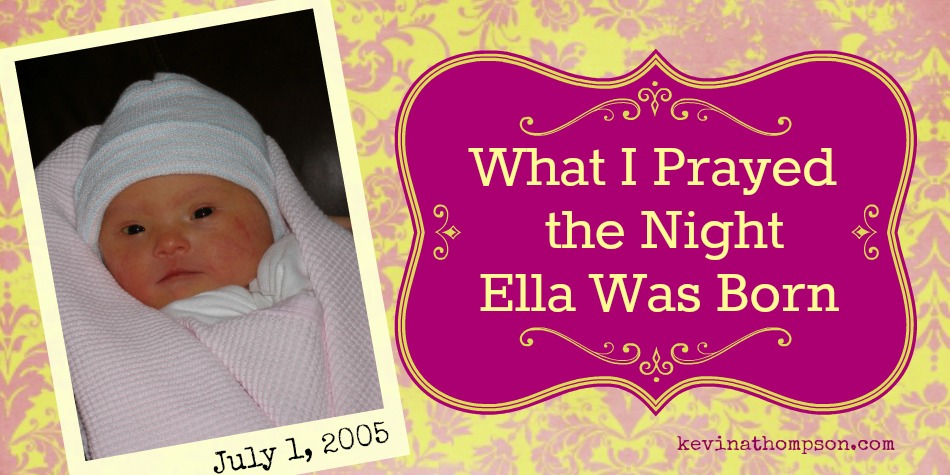Today is Ella’s ninth birthday so I’m reflecting on her birth. For last year’s post, see here.
God often gives the answer before we ask the question.
I’ve seen it in a variety of times throughout my life, but the one which I remember the most is the night our daughter was born.
The pregnancy had been routine, at least that’s what the doctors called it. For first time parents there was nothing routine about it. Pregnancy goes through several stages for men:
It begins with the “the stick says she’s pregnant but I don’t feel any different” stage. At this point everything is hypothetical. Your wife feels different. The doctor confirms the pregnancy. But nothing seems to have changed for the man. At this point the man’s only job is to say, “You are right, honey, I think you are starting to show.”
It’s not until the second stage that the pregnancy becomes real to the man. Heartbeats are heard, kicks are felt, and your wife’s body begins to drastically change. At this point, the husband’s only role is to say, “You are wrong, honey, no one can even tell you are pregnant.” (See: How Many Chromosomes Will We Have In Heaven)
The final stage of pregnancy is the “What in the world have I done to my wife’s body” stage. This is a fascinating time in which things are happening to the body of a woman which seem unimaginable. God might have created the process but every good husband feels guilty during this stage because of what is taking place. At this point the husband’s only role is to say nothing—ever.
But eventually the baby is born. And when the birth takes place, most husbands experience in a moment what their wives experienced nine months earlier. It’s not really until a baby is born that a man feels like a father.
It’s rare to live a moment that you know you will remember forever. Driving for the first time, walking in graduation, and getting married are a few of life’s major memorable events. So is holding your firstborn child. (Sorry second- and third-borns, not only are there no pictures of you, your parents don’t remember your arrival either.)
As I held Ella for the first time, I remember what I prayed. I said, “Father, let me know this child.”
My fear as a new Dad is that I might fall for the temptation of being too hard on my first child. I didn’t want to live my life through her or force her into the direction I wanted. I felt an obligation to instill and instruct. And while those are important, I knew in that moment the challenge of the rest of my life would be to place a premium on knowing her as she was more than making her into what I wanted her to be. So I prayed, “Father, let me know this child.” (See: Children, Disability, and Abortion)
Years later it sounds like a prayer I should pray every day. It’s easy to get caught up in all the responsibilities of parenting and to lose sight of the foundational aspect of everything a parent should do—to know their child.
Without this knowledge, how could any parent
- choose the right action?
- know when to push them or when to let them be?
- know when to rescue them from potential pain or when to walk beside them as they endure pain?
- know we are doing what is best for them and not simply what is best for us?
Without knowledge of our children, we cannot truly parent our children.
Yet that’s our great temptation. We can easily be deceived into thinking we are doing what is right for them even though we don’t even know who they are. We can blindly and ignorantly approach parenthood never considering the unique make-up of our children. God has created each of them in a unique way. General principles might apply, but every action must be viewed through the prism of the make-up of each specific child. What works for one won’t work for another. What is right for one could be completely wrong for another.
What I prayed the day Ella was born is what every parent needs to pray every day.
But there is a twist. As I prayed—”Father, let me know her”—God already knew what I was soon to find out. The child I held in my arms with ten fingers and ten toes, did not have 46 chromosomes. She had 47. She had Down syndrome. (See: What Down Syndrome Teaches Us All)
Within hours of me praying my prayer, a pediatrician would reveal her diagnosis. As he left the room, Ella’s mother and I were left wondering, “What do we do now?”
Of course the answer to that question had already been answered. Our only real task was to know her and in response to that knowledge, to love her.
As it was, and is, with Ella, so it is with her brother, with your children, and with every person who comes into our lives. Our only real task is to learn about them and to love them. As we grow in our knowledge of who they were made to be, we can determine what the most loving action toward them is. We are then to take that action. (See: Down Syndrome Is Not My Problem)
Parenting a special needs child is full of many unique challenges, yet the basic principles which should guide every decision are no different than any other child. You only need to pray two basic prayers as a parent:
“Father, let me know them.”
“Father, help me love them.”




10 Responses to What I Prayed The Night Ella Was Born (and Should Pray Every Day of Her Life)